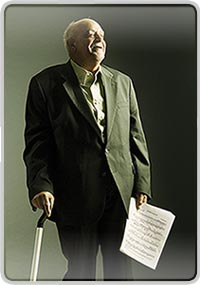New Orleans arranger, producer and bandleader Wardell Quezergue passed away this morning at East Jefferson Hospital in Metairie at age 81. The cause of death is not yet known, but Quezergue was in declining health in recent years.
Quezergue arranged and produced many soul and R&B classics, including Professor Longhair’s “Big Chief,” Robert Parker’s “Barefootin’,” Phil Phillips’ “Sea of Love,” the Dixie Cups’ “Chapel of Love,” King Floyd’s “Groove Me,” Jean Knight’s “Mr. Big Stuff” and Dorothy Moore’s “Misty Blue.” When OffBeat‘s John Swenson interviewed him in late 2007, he recalled how he and drummer Smokey Johnson wrote the New Orleans’ classic, “It Ain’t My Fault”:
We had an office on Orleans Avenue and he came in and he said “Quiz”—he used to call me Quiz—he said, “I have something I want you to hear. I want you to record this on me.” “Okay, let me hear it.” He started to diddle with his hands on my desk—dump de-dump dump dump diddle ump de-dump dump dump. I said, “That’s a good beat. Where’s the melody?” He said, “That’s where you come in!”
In his later years, Quezergue and Johnson were involved in a lawsuit over unpaid royalties for the song. The suit was settled earlier this year.
Despite being legally blind since 2005, he continued to work as much as he could. When the Ponderosa Stomp arranged for Quezergue’s orchestra to perform, he would write new charts by dictating them to his son, Brian. In our current issue, the Stomp’s Ira Padnos remembers asking Mac Rebennack if he would perform “Storm Warning” and some of the guitar-based songs he recorded before adopting the Dr. John persona at the 2008 Stomp. “As long as Wardell [Quezergue] does the arrangements, I’ll be willing to take a stab at it, ” said Rebennack, who also had Quezergue do the arrangements for his 1992 album “Goin’ Back to New Orleans and 2004′s N’Awlinz: Dis Dat or d’Udda.
Quezergue’s signature was the bigness of his sound, using large horn sections and strings. He was known as “the Creole Beethoven,” but he explained the nickname’s origins to Swenson with gentle, self-mocking humor:
The thing with [Professor Longhair] is this: Fess, he had to sing live, he never did overdubs as far as I know. I think that was one of the reasons Earl [King] sang on “Big Chief.” That was the first time I worked with the Professor. “Big Chief” had five saxophones, three trumpets, three trombones and five rhythm parts. Artists weren’t used to working with bands like that. I guess that’s how I got the nickname “Creole Beethoven”—not because I’m so brainy; it’s just that everything I did was so loud.
Quezergue was given an honorary degree by Loyola in 2009, and his career was celebrated in New York City that July in an event at Alice Tully Hall.

No comments:
Post a Comment